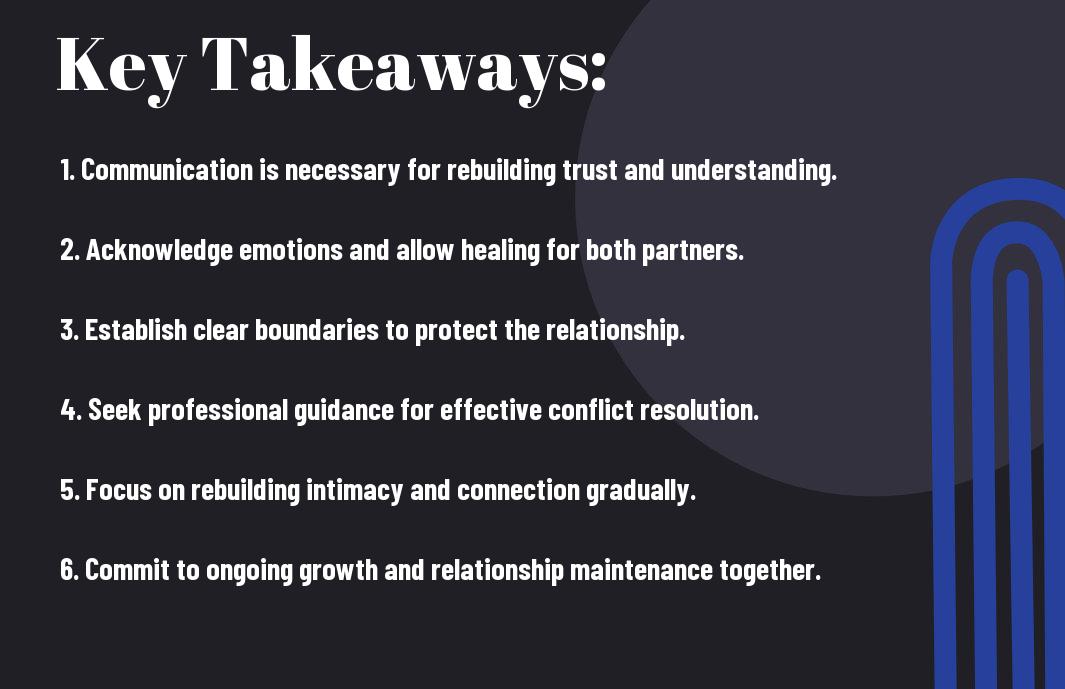Over time, relationships can face significant challenges, including infidelity. If you’re dealing with the aftermath of an affair, it’s important to recognize both the emotional turmoil and the opportunity for growth that lies ahead. This guide will provide you with practical steps and insights to help you navigate the complex journey of affair recovery, fostering healing, communication, and ultimately, a stronger bond with your partner. By understanding how trust can be rebuilt and emotional connection restored, you can work towards transforming your relationship for the better.
Key Takeaways:
- Understanding emotional impact: Acknowledge and address the feelings of hurt, betrayal, and anger that arise from an affair.
- Communication is imperative: Open, honest dialogue between partners helps in processing feelings and rebuilding trust.
- Set boundaries: Establish clear guidelines and boundaries for both partners to facilitate healing and restoration of trust.
- Seek professional help: Engaging a therapist or counselor can provide valuable insights and assistance in navigating the recovery process.
- Emphasize personal growth: Both partners should focus on individual self-improvement to foster a healthier relationship dynamic.
- Take time to heal: Understand that healing from an affair is a gradual process that requires patience and commitment from both partners.
- Rebuild intimacy: Work on reconnecting emotionally and physically to strengthen the bond and create a more resilient partnership.

Understanding Infidelity
Before delving into the complexities of infidelity, it is vital to grasp its underlying definitions and implications. Infidelity can significantly harm your relationship, inciting emotional turmoil and trust issues. Understanding the nature of cheating can help you navigate the rocky path of affair recovery and lay the groundwork for healing.
Types of Affairs
Across the spectrum of infidelity, there are various types that can affect your relationship:
| Emotional Affairs | Involves deep emotional connections without physical intimacy. |
| Physical Affairs | Entails intimate physical encounters with someone outside the relationship. |
| Online Affairs | Includes virtual interactions or relationships through social media or dating sites. |
| One-night Stands | Consists of brief sexual encounters without commitment or emotional investment. |
| Affairs of Convenience | Happen due to situational factors, like proximity or opportunity. |
Recognizing the different types of affairs can help you better understand the nature of the betrayal you may be facing.
Common Reasons for Cheating
By exploring what drives individuals to cheat, you can gain insight into your situation. Often, people stray due to unmet needs within their primary relationship, affecting emotional or physical fulfillment.
To further understand, people cheat for various reasons, such as a lack of emotional connection, a desire for novelty, or feeling unappreciated in their current relationship. Some might seek validation or escape from personal struggles, while others may act upon opportunistic impulses. Addressing these underlying issues can reveal important truths about both you and your partner, allowing for deeper discussions about the future of your relationship.

The Emotional Impact of an Affair
There’s no denying that an affair can significantly disrupt the emotional landscape of your relationship. It creates a rift that affects trust, intimacy, and overall satisfaction within your partnership. The feelings of betrayal, guilt, and confusion can linger, leaving both partners grappling with their emotions as they navigate the aftermath of infidelity.
Effects on the Betrayed Partner
Any partner who has been betrayed often experiences a rollercoaster of emotions, including anger, sadness, and profound disappointment. The sense of loss can be overwhelming, and the trust that once formed the foundation of your relationship might feel shattered. You may find yourself questioning your self-worth and struggling with the decision of whether to forgive and rebuild or to walk away.
Effects on the Cheating Partner
On the other hand, the cheating partner also faces emotional turmoil that can complicate the healing process. The guilt and shame associated with your actions may weigh heavily on you, leading to anxiety and regret. You might grapple with feelings of inadequacy and personal failure, as well as the fear of losing your partner forever.
Effects of the affair can extend beyond immediate emotions, influencing your self-image and mental well-being long-term. As the cheating partner, you might experience intense guilt that can hinder your personal growth. It’s crucial to confront and process these feelings instead of burying them, as unaddressed emotions can lead to long-lasting consequences in future relationships. Ultimately, recognizing and owning your mistakes while committing to change can be the first step towards healing and rebuilding a healthier connection.
The Path to Recovery
All relationships experience challenges, and when recovery from an affair begins, it’s imperative to understand that healing is a journey. This path requires dedication, patience, and an unwavering commitment to rebuilding trust. It is vital to establish open communication and create a safe space for both partners to express their feelings and concerns. By facing the pain together, you can gradually find your way back to a healthier and more fulfilling relationship.
Steps for Healing Together
Recovery starts with establishing a structured plan that encourages both partners to engage openly. Define clear boundaries, set aside time to talk through your emotions, and seek professional help if needed. Prioritize rebuilding trust through consistent actions and genuine apologies, while also allowing space for forgiveness. Each small step you take together can lead to a stronger bond and renewed hope.
Individual Healing Processes
Recovery involves individual healing alongside collective efforts. Each partner must process their feelings and experiences separately in addition to their work as a couple. It’s important to identify personal triggers, reflect on emotional wounds, and establish individual support systems, whether through therapy or trusted friends. Doing so allows you to understand your emotional landscape better, facilitating a healthier partnership moving forward.
Healing involves navigating your emotions authentically. As you initiate on this journey, prioritize self-care to regain emotional strength. It may include journaling, exercise, or seeking therapy for deeper issues. A strong foundation in self-awareness and personal growth will enable you to contribute positively to your relationship. Any resentment or unaddressed feelings can hinder your progress, so be proactive in addressing these dissonance to fully embrace healing.
Effective Communication Strategies
Now that you’ve taken the first step towards recovery, it’s vital to implement effective communication strategies. Open and honest dialogue allows both partners to express their feelings and understand each other’s perspectives. Fostering an environment of empathy and vulnerability will help you rebuild your connection and reinforce your commitment to healing together.
Discussing Feelings and Needs
Communication is key to expressing feelings and needs after an affair. You should create a safe space where both you and your partner can articulate your emotions without judgment. Regularly check in with each other, ensuring that both your and their needs are heard and valued. This openness will lay the groundwork for deeper intimacy and understanding.
Rebuilding Trust
Any effort towards rebuilding trust should begin with sincere apologies and healthy boundaries. You must demonstrate consistency and reliability in your actions, which will help your partner feel safe again. Communicating openly about expectations and addressing past grievances can facilitate a stronger bond.
Understanding rebuilding trust takes time and effort from both partners. It’s vital to acknowledge that trust was broken, and each step towards restoration needs to be deliberate. You must consistently show your commitment through transparency and accountability; this means being open about your whereabouts and maintaining honesty in all conversations. Active listening is equally important; make sure your partner feels validated in their feelings. With dedication and patience, you can create a new foundation built on honesty and respect, eventually strengthening your relationship.
Professional Support Options
Unlike navigating the tumultuous waters of affair recovery alone, seeking professional support can significantly ease the burden. Therapists and counselors offer valuable insights and tools to help you both heal and rebuild trust. Consider venturing into resources such as Recovering From The Affair: Your Guide To Saving … for guidance at your own pace.
Couples Therapy
Above all, couples therapy provides a safe space for both partners to express their emotions and work through complex feelings surrounding the affair. A licensed therapist can facilitate open communication, helping you to understand underlying issues and fostering empathy. This approach often leads to healthier relationship dynamics, providing the tools needed to establish a more resilient partnership.
Support Groups and Resources
Before choosing to work on your relationship, support groups can offer a valuable sense of community and shared experience. Connecting with others who have faced similar challenges allows you to learn from their journeys and gain insights on navigating your own situation.
Therapy and support groups enhance your recovery by creating a network of shared understanding. In these settings, you can openly discuss the pain and betrayal, receive ongoing encouragement, and find comfort in knowing you’re not alone. Engaging with others who understand your situation can help normalize feelings of anger, sadness, and confusion, ultimately aiding in your journey toward healing and restoring your relationship.

Rebuilding the Relationship
Keep in mind that rebuilding your relationship after an affair requires patience and effort from both partners. Open and honest communication is key to addressing issues and establishing trust. Focus on understanding each other’s feelings and perspectives, as this will lay the groundwork for a stronger connection and a healthier relationship moving forward.
Creating a New Foundation
Around the new foundation of your relationship, prioritize mutual respect and understanding. You should aim to create an environment where both partners feel valued and heard. This involves fostering emotional intimacy, engaging in shared activities, and making a commitment to transparency in your interactions. Building this strong base is crucial for a lasting union.
Setting Goals for the Future
Along the path of healing, it is important to set meaningful goals for your future together. Establishing shared aspirations can reignite your bond and give you both a sense of purpose. Think about areas you want to improve or experiences you want to create together, fostering an optimistic vision for your relationship.
Creating shared goals not only strengthens your partnership but also encourages individual growth. By focusing on a common vision, you will cultivate a sense of teamwork that is vital for recovery. Whether it’s improving communication skills, participating in couples therapy, or planning future adventures, these goals will provide a clear direction. Additionally, it is important to be flexible and open to adjustments, as both you and your partner will learn and grow through the healing process. Building and achieving these goals together will foster a renewed sense of trust and commitment to your relationship.
Final Words
Ultimately, by embracing the insights and strategies outlined in “Affair Recovery – The Ultimate Guide to Saving Your Relationship,” you empower yourself to navigate the complexities of healing and rebuilding trust. Your commitment to understanding the dynamics at play will not only foster personal growth but also strengthen your bond with your partner. As you initiate on this journey, keep in mind that patience, communication, and mutual effort are key components in restoring and revitalizing your relationship. Stay focused on the future, and allow yourselves to grow together through this challenging yet transformative experience.
FAQ
Q: What is the main purpose of ‘Affair Recovery – The Ultimate Guide to Saving Your Relationship’?
A: The primary goal of this guide is to assist individuals and couples in overcoming the challenges posed by infidelity. It offers practical strategies, emotional support techniques, and communication tools to help partners rebuild trust, improve their relationship, and foster deeper connections after experiencing an affair.
Q: Who can benefit from reading this guide?
A: This guide is designed for anyone affected by an affair, including the person who was unfaithful, their partner, or even friends and family seeking to offer support. It serves as a resource for those wanting to navigate complex emotions, understand the impact of infidelity, and work towards healing and reconciliation.
Q: What strategies does the guide recommend for rebuilding trust after an affair?
A: The guide emphasizes open and honest communication as a foundation for rebuilding trust. It suggests setting clear expectations, being transparent about feelings and experiences, and engaging in active listening. It also advocates for establishing boundaries, practicing forgiveness, and pursuing counseling or therapy to help facilitate the healing process.
Q: How can couples effectively communicate during the recovery process?
A: Effective communication during recovery involves creating a safe space for both partners to share their thoughts and feelings without judgment. The guide encourages using “I” statements to express emotions, practicing empathy by acknowledging each other’s pain, and making time for regular check-ins to discuss progress and concerns. It highlights the importance of patience and the willingness to listen actively.
Q: Does the guide provide any resources for ongoing support?
A: Yes, ‘Affair Recovery – The Ultimate Guide to Saving Your Relationship’ includes a variety of resources, such as recommended books, websites, and professional counseling directories. Additionally, it suggests support groups where individuals can connect with others who have similar experiences, promoting community and understanding as part of the healing journey.
